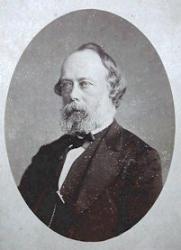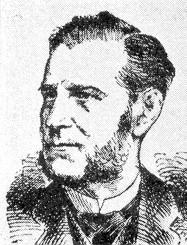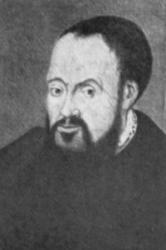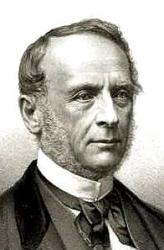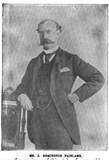1530 - 1597 Person Name: J. Leon Hymnal Number: 481 Author of "My all I to my God commend" in The Lutheran Hymnary Leon, Johannes, was a native of Ohrdruf, near Gotha. He was for some time an army chaplain, then in 1557 pastor at Königsee (Schwarzburg-Rudolstadt), in 1560 at Gross-Muhlhausen, and in 1575 at Wolfis, near Ohrdruf. He died at Wölfis about Easter, 1597 (Allg. Deutsche Biographie, xviii. 298; Wachernagel, i. pp. 466, 654; iv. p. 490, &c). Leon's hymns appeared principally in his (1) Handbüchlin, Frankfurt-am-Main, 1566, and (2) Trostbülein. The edition printed at Nürnberg, 161-1, has a preface of Dec. 9, 1588, so that the first ed. was probably 1589. His hymns are reprinted in Wackernagel, iv., Nos. 671-715. The only hymn ascribed to him which has passed into English is:—
Ich hab mein Sach Gott heimgestellt. For the Dying. Wackernagel, iv. p. 519, gives this, in 18 stanzas of 5 lines, from the Psalmen, geistliche Lieder und Kirchengesäng, Nürnberg, 1589; with a long note, in which he traces all the stanzas save xi., xiv., xv., viii., to Leon's Trostbüchlein, and to his Leich-Predigten [i.e. "Funeral Sermons"], 1581-82. Mützell, No. 347, cites it as in the Psalmen, geistliche Lieder und Lobgesänge, Strassburg, n.d., but apparently before 1587. In the Berlin Geistlicher Lieder Schatz, ed. 1863, No. 1460.This hymn has been frequently ascribed to Dr. Johann Pappus [b. Jan. 16, 1549, at Lindau on the Lake of Constanz; 1571, professor of Hebrew at the University of Strassburg; d. at Strassburg, July 13, 3610]; but this ascription has not been traced earlier than about 1640, e.g. in the Cantionale sacrum, Gotha, pt. iii., 1648, No. 18, and the Königsberg Gesang-Buch, 1650, p. 530. Lauxmann, in Koch, viii. 609, thinks that Pappus may have arranged the hymn in its present form. It was probably suggested by a song beginning, "Ich hab meine Sach zu Gott gestellt," which Wackernagel iii., Nos. 1242, 1243, quotes from a Leipzig broadsheet of 1555, and other sources. This hymn has been translated as:—
1. My Life I now to God resign. By J. O. Jacobi, in his Psalter Germanica, pt. ii., 1725, p. 56 (1732, p. 199), omitting st. vii., xv., xvi. Repeated in the Moravian Hymn Book, 1754, pt. i., No. 313 (1886, No. 1242, beginning with the translation of st. viii., "Teach us to number so our days"), and in J. A. Latrobe's Collection, 1841 and 1852. In the Bible Hymn Book1845, it begins with st. iii., "What is this life? a constant scene."
2. My all I to my God commend. A very good translation of stanzas i., iii., vi., viii., x., xi., xiv., xvii., by A. T. Russell, as No. 246, in his Psalms & Hymns 1851; repeated, abridged, in Dr. Pagenstecher's Collection, 1864, and Kennedy, 1863, No. 156. Dr. Kennedy, also gives a cento, beginning with the translation of stanza x., "Few are our days and sad below."
3. My cause is God's, and I am still. A good tr. of stanzas i., xi.-xiv., xvi.-xviii., by Miss Winkworth, in her Lyra Germanica, 2nd Ser., 1858, p. 210; repeated, omitting the translations of stanzas xii., xvii., in her Chorale Book for England, 1863, No. 127. [Rev. James Mearns, M.A.]
--John Julian, Dictionary of Hymnology (1907)
Johannes Leon


 My Starred Hymns
My Starred Hymns